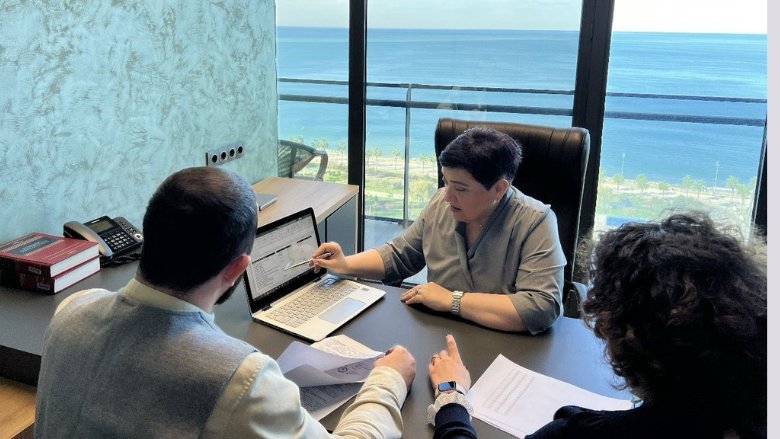Lali Chikhladze—chief accountant at Thermo Center, a medium-size heating equipment supply company in Tbilisi, Georgia—was eight months pregnant with her first child when she attended a training on how to prepare financial reports and disclosures for small and medium enterprises (SMEs). The mother of three, Lali sees real value from these trainings for Thermo Center as well as her productivity and professional development.
“When I look back, I realize that my decision to enroll for the training despite expecting a child in just a month was absolutely the right move. This opportunity led to professional growth for me and, at the same time, had a tangible impact for our company,” said Lali. “The knowledge I gained enabled my company to reduce costs as we started preparing the financial reports in-house instead of employing an outside accounting firm.”
Lali's story is just one of over 700 employees at SMEs across Georgia who have benefited from these trainings organized through the EU-financed and World Bank implemented Georgia Financial Inclusion and Accountability Project (GFIA). Launched just as the country adopted the International Financial Reporting Standard for SMEs (IFRS for SMEs), these trainings have not only raised awareness on the new standards and how to prepare company financial reports accordingly, but helped SMEs become more efficient.
“Thanks to the trainings, which were organized in a very professional manner and played a role as a guide in my further professional development and activities, I am now able to do my job in less time and be more efficient,” stressed Maia Peikrishvili, a 55-year-old grandmother from Batumi who works at a small auditing firm Prestige Audit LTD.
Maia and Lali were among 700 accountants trained in IFRS for SMEs between 2019 and 2022 through GFIA. And most of these accountants in post-training evaluations were satisfied with the sessions, indicating they found them useful and the trainers competent.
Why Streamlining Reporting Matters for Georgia
Ask any entrepreneur what they enjoy most about owning and operating their small business, and none of them would say it is filing financial reporting forms. While large firms and corporations often have accounting departments to handle stringent financial disclosures and reporting standards, small and medium-sized enterprises often lack the resources, staff, and time to deal with what in many developing countries can be thousands of pages of required paperwork. This can have severe consequences for SMEs—which represent nearly 95% of all companies globally—and the wider economy: would-be entrepreneurs see another obstacle to launching new ventures or decide to shutter business; others are incentivized to misreport or cut corners; mistakes can bring costly audits and lawsuits for small business owners; and lack of financial transparency scares away potential investors—foreign and domestic.
Georgia has sought to tackle these challenges head-on, attempting to make transparency and accountability less of burden to support SMEs and boost the country’s investment potential. By adopting the IFRS for SMEs, the country has slimmed down reporting standards for such businesses to 10% of what is required for larger firms. Doing so makes compliance less burdensome, expensive and time consuming for Georgia's SMEs.
While adoption of these standards has sent an important signal to the international investment community that the country is serious about improving the quality and transparency of company reporting, Georgia still needs SMEs to understand and follow the new, streamlined process. That’s where trainings through GFIA for accountants and other employees at SMEs play a crucial role in raising awareness, boosting compliance, and improving the quality of financial reporting for small firms.
Impact Achieved: Better Reporting, Better Business.
While well-received by participants, have these trainings produced the desired impact? The data suggests so. SARAS, Georgia’s accounting and auditing regulator, has identified that 23% of company reports published by small firms in 2019 had errors. In 2021, the error rate had dropped to 9%.
“We observed a significant decrease in the error rate concerning compliance with the Law and relevant regulations for SMEs. Despite persistent challenges, there is a noticeable improvement in the quality of reports. This improvement significantly contributes to facilitating these entities' access to finance,” said David Mchedlidze, Head of SARAS.
And by the end of 2022, 4,929 SMEs in Georgia were preparing financial statements based on IFRS for SMEs.
Long-term, the new reporting standards and concurrent accounting trainings will continue to improve transparency and generate real impact for SMEs and their employees like Lali and Maia, which in turn will help create jobs, attract investment, and build a more resilient and inclusive economy in Georgia.



